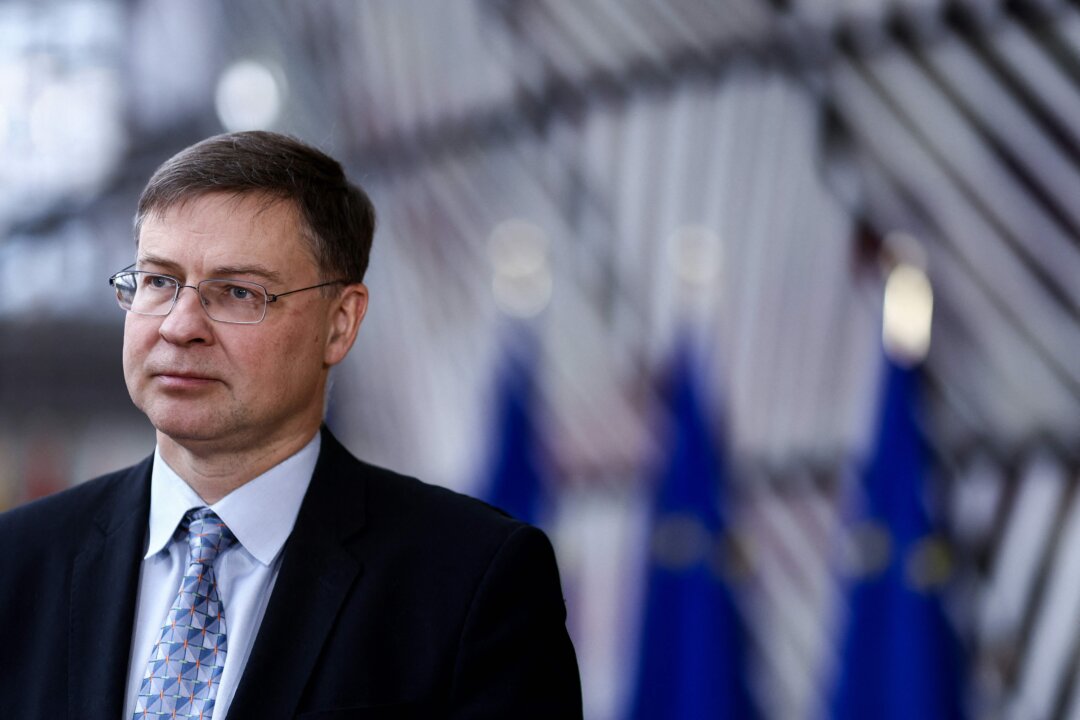China’s anti-subsidies investigations into brandy, pork, and dairy shipped from the European Union (EU) are “unwarranted” and “lack sufficient evidence,” the bloc’s trade commissioner, Valdis Dombrovskis, said on Sept. 19.
Dombrovskis conveyed this message during a meeting with his Chinese counterpart, Wang Wentao, who visited Brussels in an effort to stop the imposition of extra tariffs on electric vehicles (EVs) made in China.
Dombrovskis described the meeting with Wang as constructive.
“Both sides agreed to intensify efforts to find an effective, enforceable and [World Trade Organization] compatible solution” to the EV case “without prejudice to the EU investigation and its deadlines,” Dombrovskis said on social media platform X.
The European Commission, the EU’s executive arm, slightly lowered duties on Aug. 20, proposing up to 36.6 percent tariffs on EVs shipped from China.
Brussels viewed extra duties as necessary steps to level the playing field. The commission previously said the substantial subsidies provided by the communist regime have given EV producers in China an “unfair” trade advantage and threatened to hurt the EU market by artificially lowering the prices.
Beijing criticized the EU’s plan as “unfair.” On Aug. 21, China’s commerce ministry broadened its trade investigations into EU imports, adding cheese, milk, and cream products to its ongoing anti-subsidies reviews of pork and brandy.
During the meeting with Wang, Dombrovskis expressed the EU’s “strong concerns” regarding China’s “trade defense investigations” against brandy, pork, and dairy from the bloc, according to the EU readout.
“He stressed that these investigations are unwarranted, are based on questionable allegations, and lack sufficient evidence,” the commission said.
Dombrovskis “thus called for these investigations to be terminated and informed the Chinese side that the EU will do its utmost to defend the interests of its industries.”
China’s Ministry of Commerce said Wang and Dombrovskis have agreed to negotiate a mutually acceptable solution.
However, Wang warned Dombrovskis that if the EU insists on “implementing unreasonable tariffs, China will resolutely take necessary measures.”
EV Tariff Vote Looming
Chinese carmakers had offered new price undertakings, a commitment to set a selling price floor on their products to avoid tariffs.
After reviewing the proposals earlier this month, the EU rejected the proposals and said the minimum price offers would not offset the injuries caused by Beijing’s state subsidies. Beijing’s deadline to present a new commitment has already passed.
The EU’s 27 member states are scheduled to vote in the coming weeks on whether to impose five-year EV duties.
The introduction of EV duties could be defeated only if a qualified majority of 15 EU members representing 65 percent of the EU population votes against the proposals.
Before meeting the EU trade chief, Wang sat down with representatives from Chinese and European EV makers on Sept. 18 and vowed to persist in the negotiation efforts “until the last minute,” according to his ministry.
Wang also engaged with senior trade officials in Rome and Berlin earlier this week. During a meeting with German Vice Chancellor Robert Habeck on Sept. 17, Wang said the EU’s tariffs hike could “seriously interfere” with trade and investment cooperation, affecting the interests of both Beijing and Berlin, according to China’s readout.
According to a meeting summary, Habeck, who also heads the economy ministry, said the EU and China should make every effort to find a negotiated solution. He told Wang that while Berlin embraces competition, “it must take place under fair terms.”
Italian Foreign Minister Antonio Tajani, in an interview published on Sept. 16 before meeting Wang, said Rome backs the duties proposed by the EU to protect the competitiveness of their own carmakers.
Trade tensions have risen in recent months after the Chinese communist regime opened a series of tit-for-tat trade probes into EU products.
The regime has already taken Brussels’s proposed duties to the World Trade Organization. In a sign of possible further retaliation against the EU’s tariff hikes, Chinese officials discussed “raising the import tariffs on fuel-powered cars with large displacement engines” during a meeting with its automakers and industry associations on Aug. 23, the commerce ministry said in a one-line statement published on its website.
In a June report, Chinese state-run media outlet Global Times raised the prospect of duties hikes on large-engined gasoline cars imported from the EU.
Concerns Over China’s EV Export
Beijing’s series of retaliative moves reflects the deep concerns among the Chinese Communist Party (CCP) leaders, who view the EV industry as central to its quest to control the global export market, according to David Huang, a U.S.-based economic researcher and commentator.
Huang said in a recent interview with The Epoch Times that China’s exports were initially driven by labor-intensive industries such as household appliances, furniture, and clothing.
In recent years, facing a stumbling economy, the CCP leaders have “eyes on increasing China’s global export market share by targeting emerging industries, electric vehicles, batteries, and solar panels,” which they called a new productive force, he said.
The CCP’s goals are not only about reviving its economy. By flooding the global market with China-made EVs, the CCP aims to harvest data from a larger user base in other countries and push its control further beyond the borders, according to Huang.
“Have you ever thought about why a country that can’t provide free medical care or education for all is pouring so much money [into the EV industry]?” Huang said.
Developing the EV industry, according to Huang, is likely to be part of the CCP’s strategy to “tighten the grip over the entire society.”
Huang said EVs are more than a part of China’s efforts to break the current bottleneck in exports and regain the global market for high-value export commodities.
“It’s really all about the surveillance of both Chinese and global users. They collect personal data, location information, and various other data through a multitude of sensors in electric vehicles,” Huang said. “If you use your phone or laptop in the car, [the CCP] might also be watching or listening.”
Luo Ya and Reuters contributed to this report.

